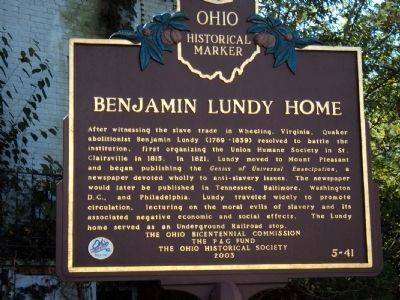
The American philanthropist Benjamin Lundy, prominent in the anti-slavery conflict, was born of Quaker parentage, at Hardwick, Warren county, New Jersey, on the 4th of January 1789. As a boy he worked on his father's farm, attending school for only brief periods, and in 1808-1812 he lived at Wheeling, Virginia (now in West Virginia), where he served an apprenticeship to a saddler, and where -- Wheeling being an important headquarters of the inter-State slave trade -- he first became deeply impressed with the iniquity of the institution of slavery, and determined to devote his life to the cause of abolition.
In 1815, while living at Saint Clairsville, Ohio, he organized an anti-slavery association, known as the "Union Humane Society", which within a few months had a membership of more than five hundred men. For a short time he assisted Charles Osborne in editing the Philanthropist; in 1819 he went to St. Louis, Missouri, and there in 1810-1820 took an active part in the slavery controversy; and in 1821 he founded at Mount Pleasant, Ohio, an anti-slavery paper, the Genius of Universal Emancipation. This periodical, first a monthly and later a weekly, was published successively in Ohio, Tennessee, Maryland, the District of Columbia and Pennsylvania, though it appeared irregularly, and at times, when Lundy was away on lecturing tours, was issued from any office that was accessible to him. From September 1829 until March 1830 Lundy was assisted in the editorship of the paper by William Lloyd Garrison.

The Benjamin Lundy House, located at the intersection of Union (State Route 647) and Third Streets in Mount Pleasant, Ohio, United States. Built in 1820, it is a National Historic Landmark, and it is part of the Mount Pleasant Historic District, which is also a National Historic Landmark.
Besides travelling through many states of the United States to deliver anti-slavery lectures, Lundy visited Haiti twice -- in 1825 and 1829, the Wilberforce colony of freedmen and refugee slaves in Canada in 1830-1831 and in 1832 and again in 1833 Texas, all these visits being made in part, to find a suitable place outside the United States to which emancipated slaves might be sent. Between 1820 and 1830, according to a statement made by Lundy himself, he traveled "more than 5000 miles on foot and 20,000 in other ways, visited nineteen states of the Union, and held more than 200 public meetings." He was bitterly denounced by slaveholders and also by such non-slaveholders as disapproved of all anti-slavery agitation, and in January 1827 he was assaulted and seriously injured by a slave-trader, Austin Woolfolk, whom he had severely criticized in his paper.

In 1836-1838 Lundy edited in Philadelphia a new anti-slavery weekly, The National Enquirer, which he had founded, and which under the editorship of John Greenleaf Whittier, Lundy's successor, became The Pennsylvania Freeman. In 1838 Lundy removed to Lowell, La Salle county, Illinois, where he printed several copies of the Genius of Universal Emancipation. There, on the 22nd of August 1839, he died. Lundy is said to have been the first to deliver anti-slavery lectures in the United States. [source: http://www.nndb.com/people/120/000049970/]

No comments:
Post a Comment